
Reggae is a music genre that originated in Jamaica in the late 1960s. The term also denotes the modern popular music of Jamaica and its diaspora. A 1968 single by Toots and the Maytals, "Do the Reggay", was the first popular song to use the word reggae, effectively naming the genre and introducing it to a global audience. While sometimes used in a broad sense to refer to most types of popular Jamaican dance music, the term reggae more properly denotes a particular music style that was strongly influenced by traditional mento as well as American jazz and rhythm and blues, and evolved out of the earlier genres ska and rocksteady. Reggae usually relates news, social gossip, and political commentary. It is instantly recognizable from the counterpoint between the bass and drum downbeat and the offbeat rhythm section. The immediate origins of reggae were in ska and rocksteady; from the latter, reggae took over the use of the bass as a percussion instrument.
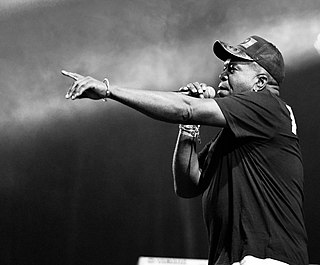
Barrington Ainsworth Levy is a Jamaican reggae and dancehall artist.
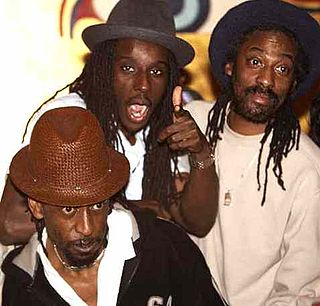
Aswad are a British reggae group, noted for adding strong R&B and soul influences to the reggae sound. They have been performing since the mid-1970s, having released a total of 21 albums. Their UK hit singles include the number one "Don't Turn Around" (1988) and "Shine" (1994). "Aswad" is Arabic for "black". They are three-time Grammy Award nominees.
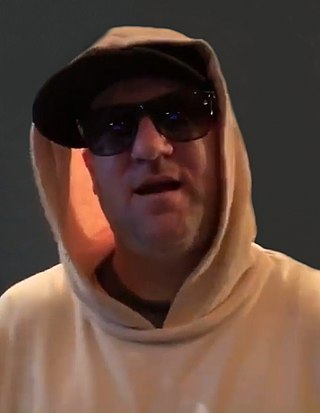
Darrin Kenneth O'Brien, known by his stage name Snow, is a Canadian reggae musician, rapper and singer. His 1992 single "Informer" spent seven weeks at No. 1 on the US Billboard Hot 100.

Third World is a Jamaican reggae fusion band formed in 1973. Their sound is influenced by soul, funk and disco. Although it has undergone several line-up changes, Stephen "Cat" Coore and Richard Daley have been constant members.
Rexton Rawlston Fernando Gordon, better known by his stage name Shabba Ranks, is a Jamaican dancehall musician. In the late 1980s and early 1990s, he was one of the most popular Jamaican musicians in the world. Throughout his prominence in his home country as a dancehall artist, he gained popularity in North America with his studio album, Just Reality, in 1990. He released two studio albums, As Raw as Ever and X-tra Naked, which both won a Grammy Award as Best Reggae Album in 1992 and 1993, respectively. He is notoriously popular for "Mr. Loverman" and "Ting-A-Ling", which were globally acclaimed and deemed his signature songs.
Reggae Sunsplash is a reggae music festival first staged in 1978 in northern Jamaica. In 1985, it expanded with the addition of an international touring festival. The festival ran annually until 1996, with a final event in 1998, before it was revived in 2006. The festival returned for a virtual staging in 2020 produced by Tyrone Wilson, Randy McLaren, and Debbie Bissoon.
Shinehead is a British Jamaican reggae singer/toaster/rapper.

Chaka Demus & Pliers are a Jamaican reggae duo made up of deejay Chaka Demus and singer Pliers, known for their hits "Tease Me" and "Murder She Wrote". As a duo, they enjoyed more commercial success with mainstream pop fans after their collaboration began in the early 1990s than either had in their previous solo careers.
Michigan and Smiley are a Jamaican reggae/dancehall duo consisting of Papa Michigan and General Smiley. They rose to popularity during the first wave of dancehall music in the late 1970s.

No Reservations is the debut studio album by British-Asian musician Apache Indian, released in January 1993 by Island Records and their subsidiary Mango. The musician and singer recorded the album primarily in Jamaica's Tuff Gong studios with producers including Simon and Diamond, Bobby Digital, Phil Chill and Sly Dunbar. It follows, and includes, Apache Indian's 1990–91 singles – "Move Over India", "Chok There" and "Don Raja" – which saw him pioneer a fusion of Jamaican ragga and Indian bhangra later known as bhangramuffin.
Reggae fusion is a fusion genre of reggae that mixes reggae and/or dancehall with other genres, such as pop, rock, hip-hop/rap, R&B, jazz, funk, soul, disco, electronic, and latin, amongst others.
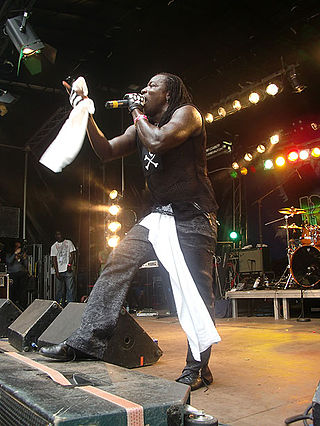
Ewart Everton Brown, better known by his stage name Mad Cobra or simply Cobra, is a Jamaican dancehall musician.
Norman Washington Jackson, better known as Tiger, is a Jamaican dancehall musician active since the late 1970s. He is known for his growling style of deejaying, often imitated by other dancehall deejays since his initial rise to fame.

Rhythm Killers is an album by Jamaican musical duo Sly and Robbie, released in May 1987 by Island Records. By the time of the album's recording, Sly and Robbie had transitioned away from their prolific work in the reggae genre. They spent the 1980s experimenting with electronic sounds and contemporary recording technology on international, cross-genre endeavors, which influenced their direction for Rhythm Killers.

Fredrick “Freddie” McGregor is a Jamaican singer, musician and record producer. His music career began when he was seven years old.
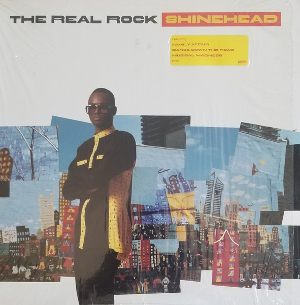
The Real Rock is a studio album by the reggae/rap musician Shinehead, released in 1990 via Elektra Records.

Unity is an album by the rap and reggae musician Shinehead, released in 1988.

Don Dada is an album by the Jamaican musician Super Cat, released in 1992. It was his first album for a major label, and also one of the first dancehall albums for a major label. The album title refers to Super Cat's nickname.

Barrington is an album by the Jamaican musician Barrington Levy, released in 1993. It was regarded as a crossover attempt. The first single was "Murder". Levy supported the album with a North American tour.














